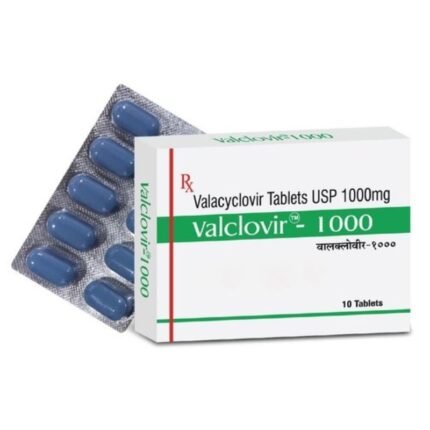Herpes Treatment: Effective Antiviral Solutions for Symptom Relief and Outbreak Control
Herpes is a common viral infection caused by the herpes simplex virus (HSV), which includes HSV-1 (oral herpes) and HSV-2 (genital herpes). While there is no permanent cure for herpes, medical treatments can effectively reduce symptoms, shorten outbreak durations, and minimize the risk of transmission.
This guide explores leading antiviral medications, how they work, and tips for managing herpes outbreaks confidently and safely.
Valclovir 1000mg Tablets (Valacyclovir 1000mg)
Price range: $249.00 through $719.00🔬 What is Herpes?
Herpes is a lifelong infection that often remains dormant and reactivates during periods of stress, illness, or immune suppression. It presents as:
-
Cold sores or blisters around the mouth (HSV-1)
-
Painful genital lesions and itching (HSV-2)
-
Tingling, burning, or nerve pain before an outbreak
-
Flu-like symptoms during initial infection
The virus spreads through direct skin-to-skin contact or through sexual activity, even when no visible sores are present.
💊 Most Common Herpes Medications
Medical therapy can reduce the frequency and severity of herpes outbreaks, especially if started early. Common antiviral drugs include:
1. Acyclovir
-
First-line antiviral for HSV-1 & HSV-2
-
Available as tablets, ointments, and injections
-
Ideal for initial and recurrent outbreaks
2. Valacyclovir (Valtrex)
-
A more advanced form of Acyclovir with better absorption
-
Requires fewer doses per day
-
Used for treatment and daily suppression therapy
3. Famciclovir
-
Effective for genital herpes and shingles
-
Well-tolerated and convenient dosing
4. Topical Antivirals
-
Acyclovir cream or penciclovir cream for cold sores
-
Helps reduce pain and healing time
✅ Benefits of Herpes Medication
-
Shortens duration of outbreaks
-
Reduces severity of symptoms (pain, itching, blisters)
-
Decreases risk of transmitting the virus to partners
-
Suppressive therapy can prevent future outbreaks
-
Safe for long-term use under medical supervision
🧠 Tips for Managing Herpes
-
Begin medication at first sign of symptoms (tingling or burning)
-
Use condoms and avoid contact during outbreaks
-
Take daily suppressive treatment if you have frequent recurrences
-
Avoid triggers such as stress, illness, or poor sleep
-
Maintain a strong immune system with a proper diet and rest
-
Inform your partner and consider treatment together
⚠️ Possible Side Effects
Most herpes medications are safe, but can occasionally cause:
-
Headache or nausea
-
Stomach discomfort
-
Rash or allergic reaction
-
Kidney strain (in people with pre-existing kidney issues)
-
Always follow dosage instructions and inform your doctor of other medications
Frequently Asked Questions (FAQs)
Can herpes be cured completely?
No, but medications can manage symptoms and prevent outbreaks effectively.
How often should I take herpes medication?
For outbreaks: typically 2–5 times a day for 5–10 days. For suppression: once or twice daily. Follow your doctor’s advice.
Can I take these drugs during pregnancy?
Yes, especially Acyclovir and Valacyclovir, but only under a doctor’s guidance to reduce transmission risk to the baby.
Is it safe to use herpes creams with oral tablets?
Yes. Combining topical and oral treatments can speed up healing during outbreaks.
📝 Conclusion
Living with herpes doesn’t mean living in fear. With trusted antiviral medications and a proactive management plan, most people with HSV live healthy, confident lives. Early treatment, informed precautions, and medical support can help you minimize symptoms and protect your health—and your partner’s.
Explore our selection of reliable herpes treatments and take control of your symptoms today.



